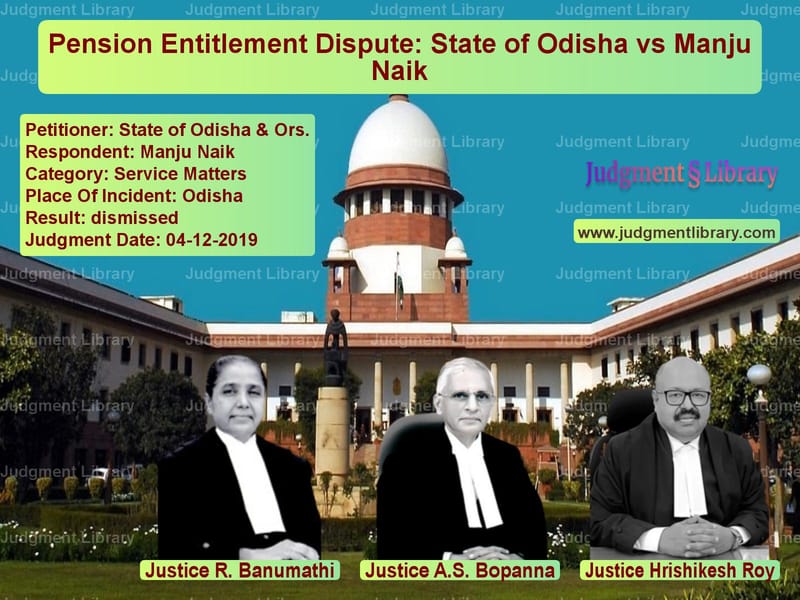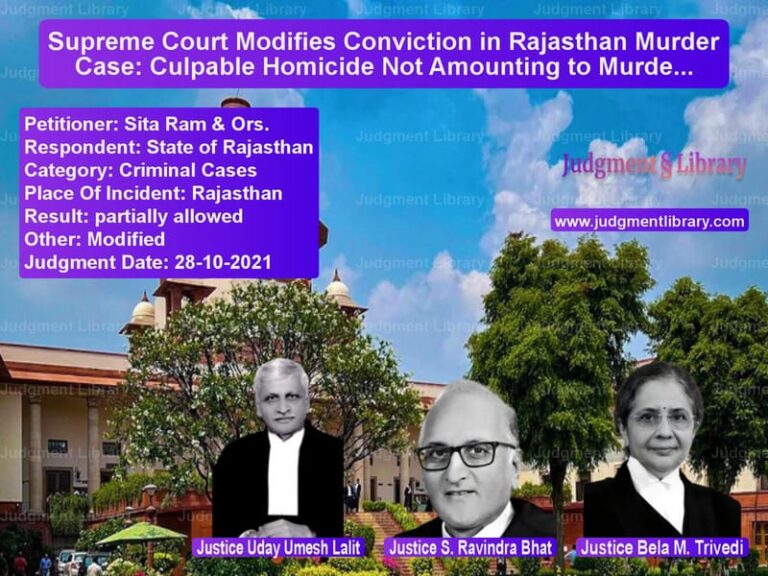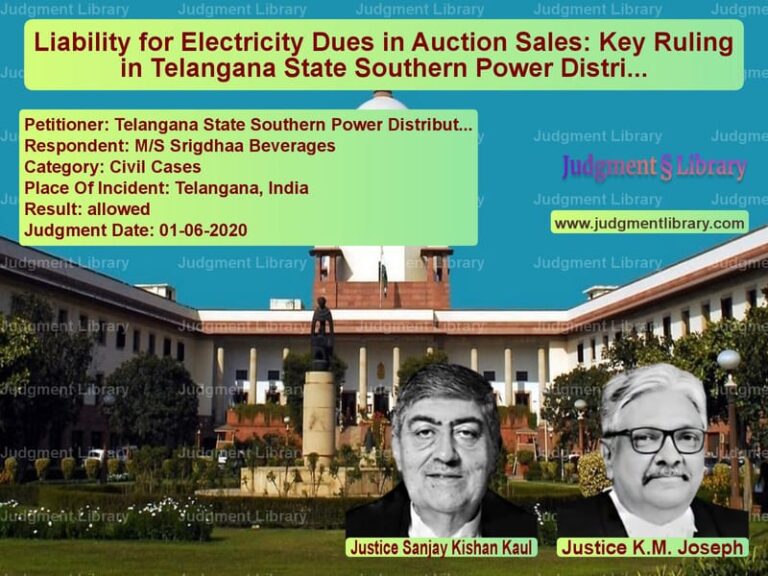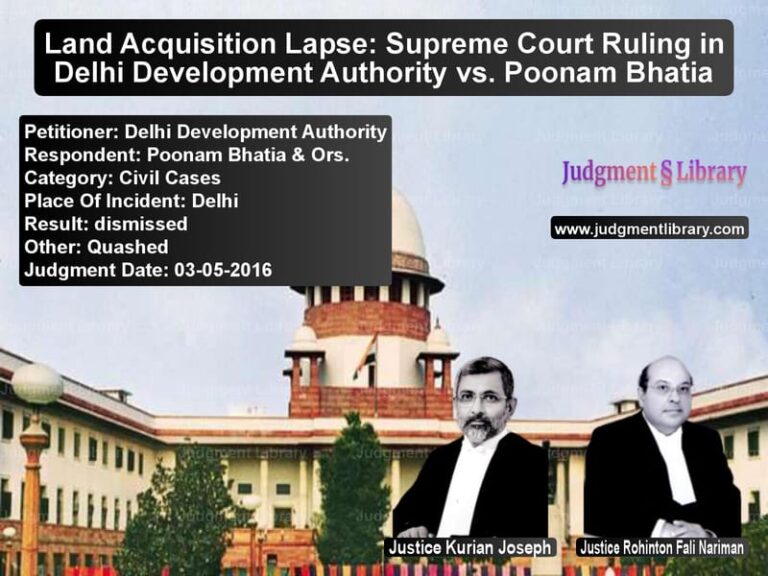Pension Entitlement Dispute: State of Odisha vs Manju Naik
This case concerns the entitlement to invalid pension for the late Sagar Naik, who was retired on grounds of mental incapacity. His widow, Manju Naik, filed a petition before the Odisha Administrative Tribunal seeking the sanction of invalid pension for her late husband and family pension after his death. The key legal issue revolves around whether Sagar Naik’s lack of qualifying service of ten years prevents him from being entitled to invalid pension under the Orissa Civil Services (Pension) Rules, 1992.
Key Facts:
- Sagar Naik, a government employee, was retired on 6.7.1996 due to mental incapacity after serving in a government department under the Rehabilitation Assistance Scheme.
- The applicant, Manju Naik, sought invalid pension for her late husband, as well as family pension after his death in 1996, claiming that her husband was entitled to both under the Orissa Pension Rules.
- The appellants, representing the State of Odisha, argued that Sagar Naik did not fulfill the required qualifying service of ten years, as prescribed in Rule 47 of the Pension Rules. The State contended that this made him ineligible for invalid pension.
- The Odisha Administrative Tribunal ruled in favor of Manju Naik, directing the authorities to sanction invalid pension and family pension. The High Court dismissed the State’s appeal, upholding the Tribunal’s order.
Petitioner and Respondent Arguments:
Petitioner (State of Odisha): The appellants argued that Sagar Naik’s qualifying service was less than the ten-year minimum required for pension entitlement under the Pension Rules. They also contended that the respondent was not eligible for invalid pension under Rule 39, as his service did not meet the necessary criteria, and that the Tribunal’s order was in error by awarding pension without considering the service requirements.
Respondent (Manju Naik): The respondent, Manju Naik, contended that her late husband’s mental incapacity should entitle him to invalid pension under Rule 39, which allows for pension in the case of permanent incapacity. She also claimed that family pension should be granted after his death in 1996, as provided under the Pension Rules, given that her husband’s retirement was caused by mental incapacity.
Important Judge Arguments:
Justice R. Banumathi: Justice Banumathi emphasized that the Pension Rules explicitly require a minimum qualifying service of ten years for the entitlement of invalid pension. She agreed with the State’s argument that the deceased did not meet this criterion, and therefore, invalid pension could not be sanctioned under Rule 39. The Court also noted that pension benefits could not be granted based solely on compassion when the statutory eligibility criteria were not met.
Justice A.S. Bopanna: Justice Bopanna concurred with Justice Banumathi’s interpretation of the Pension Rules. He pointed out that the respondent had not raised the issue of invalid pension at the time of her husband’s retirement or during the subsequent period, and the claim was belated. He further emphasized that the provision for invalid pension was subject to the completion of the qualifying service, and the appellant’s husband did not fulfill this requirement.
Justice Hrishikesh Roy: Justice Roy agreed with the majority opinion but provided further reasoning regarding the harmonious construction of the Pension Rules. He explained that pension is a reward for long and continuous service, and the rules stipulated that employees must meet the qualifying service requirement to be eligible for pension. Given the respondent’s husband’s lack of ten years of qualifying service, the Court found it difficult to grant the invalid pension, as it would undermine the uniformity and integrity of the Pension Rules.
Legal Provisions Discussed:
- Rule 39 (Invalid Pension) of the Orissa Civil Services (Pension) Rules: This rule allows for the grant of invalid pension when a government employee retires due to bodily or mental infirmity that permanently incapacitates them from continuing their duties.
- Rule 47 (Eligibility for Pension) of the Orissa Civil Services (Pension) Rules: This rule specifies that employees must complete ten years of qualifying service to be eligible for pension benefits, including invalid pension.
- Rule 56 (Family Pension) of the Orissa Civil Services (Pension) Rules: This rule ensures that the family of a deceased employee, who was in receipt of pension or compassionate allowance, is entitled to family pension after their death.
Final Judgment:
The Supreme Court, after considering the arguments, dismissed the appeal filed by the State of Odisha. The Court upheld the decision of the Tribunal and the High Court, ruling that the respondent’s late husband was entitled to family pension, but did not qualify for invalid pension due to the failure to meet the minimum qualifying service requirement of ten years. The Court also noted that the respondent’s husband had been granted service gratuity and other terminal benefits, which were in line with the Pension Rules for employees who did not meet the ten-year service criterion.
Conclusion:
This case highlights the importance of adhering to the qualifying service requirements under pension schemes. While compassion is an essential consideration, statutory eligibility criteria cannot be overlooked. The Court’s decision reinforces the need for a clear and consistent application of pension rules to ensure fairness and compliance with legal provisions in all government service matters.
Petitioner Name: State of Odisha & Ors..Respondent Name: Manju Naik.Judgment By: Justice R. Banumathi, Justice A.S. Bopanna, Justice Hrishikesh Roy.Place Of Incident: Odisha.Judgment Date: 04-12-2019.
Don’t miss out on the full details! Download the complete judgment in PDF format below and gain valuable insights instantly!
Download Judgment: State of Odisha & Or vs Manju Naik Supreme Court of India Judgment Dated 04-12-2019.pdf
Direct Downlaod Judgment: Direct downlaod this Judgment
See all petitions in Employment Disputes
See all petitions in Pension and Gratuity
See all petitions in Public Sector Employees
See all petitions in Judgment by R. Banumathi
See all petitions in Judgment by A. S. Bopanna
See all petitions in Judgment by Hrishikesh Roy
See all petitions in dismissed
See all petitions in supreme court of India judgments December 2019
See all petitions in 2019 judgments
See all posts in Service Matters Category
See all allowed petitions in Service Matters Category
See all Dismissed petitions in Service Matters Category
See all partially allowed petitions in Service Matters Category







